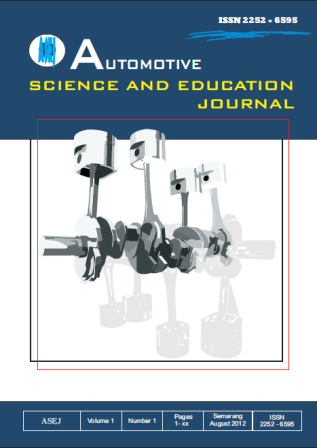PENERAPAN MODEL EXPLICIT INSTRUCTION BERBANTUAN JOBSHEET UNTUK MENINGKATKAN HASIL BELAJAR KOMPETENSI PERBAIKAN SISTEM KOPLING
Main Article Content
Abstract
Permasalahan yang diangkat dalam penelitian ini yaitu guru kurang memperhatikan pemilihan model pembelajaran yang cocok diterapkan untuk memenuhi kompetensi yang harus dicapai, hasil belajar siswa yang dilihat dari nilai ulangan harian kelas XI TKR 1 masih tergolong kurang baik sehingga diperlukan perlakuan untuk meningkatkan hasil belajar siswa, guru kurang maksimal menerapkan model pembelajaran langsung akibatnya dalam pelaksanaan pembelajaran tidak sesuai dengan sintaks pembelajaran langsung yang ada sehingga siswa kurang memahami tujuan pembelajaran. Penelitian ini bertujuan untuk mengetahui penerapan model explicit instruction berbantuan jobsheet di SMK Negeri 1 Petarukan, untuk mengetahui nilai siswa sebelum dan setelah diterapkan model explicit instruction berbantuan jobsheet, untuk mengetahui tanggapan guru dan siswa terhadap penerapan model explicit instruction berbantuan jobsheet di SMK Negeri 1 Petarukan. Penelitian ini merupakan Penelitian Tindakan Kelas (PTK). Subyek penelitian ini siswa kelas XI TKR 1 SMK Negeri 1 Petarukan tahun ajaran 2013/2014 dengan jumlah 38 siswa. Dari hasil penelitian menunjukkan bahwa penerapan model explicit instruction berbantuan jobsheet dapat meningkatkan hasil belajar siswa kelas XI TKR 1 SMK Negeri 1 Petarukan. Hal ini dibuktikan dengan meningkatnya hasil belajar siswa dengan pencapaian rata-rata pra siklus 63,45, siklus I yaitu 77,13, siklus II yaitu 82,87. Sedangkan presentase Kriteria Ketuntasan Minimal (KKM) mencapai 21,05% pada pra siklus, 84,21% pada siklus I, 92,11% pada siklus II. Rata-rata tanggapan guru sebesar 83,93% yang termasuk dalam kategori baik dan siswa sebesar 85,81% yang termasuk dalam kategori sangat baik.
Issues raised in this study are the teachers less suitable learning model selection applied to meet the competencies to be achieved, the results of students learning the value of result of Deuteronomy daily class XI TKR 1 still belongs to the less well so it is necessary to improve the treatment results of student learning, teachers applying learning model is insufficient direct consequences in the implementation of learning does not comply with the syntax of an existing direct learning so that students understand the purpose of learning. This study aims to determine the application of the explicit instruction aided jobsheet in SMK Negeri 1 Petarukan , to determine the value of students before and after application of the explicit instruction model aided jobsheet, to determine the response of teachers and students to the application of the explicit instruction model aided jobsheet in SMK Negeri 1 Petarukan . This research is Classroom Action Research ( CAR). The subjects XI TKR 1 class student of SMK Negeri 1 Petarukan school year 2013/2014 the number of 38 students . The results showed that the application of the explicit instruction model aided jobsheet to improve study’s result of students of class XI TKR 1 SMK Negeri 1 Petarukan . This is evidenced by the increasing achievement of student study’s result with pre-cycle average of 63.45 , which is 77.13 first cycle , the second cycle is 82.87. While the percentage of completeness Minimum Criteria ( KKM ) reached 21.05 % in the pre cycle , 84.21 % in the first cycle , 92.11 % in the second cycle. Averages responses of teachers amount 83,93% as fine category and students responses amount 85,81% as very fine category.
Article Details
Proposed Creative Commons Copyright Notices
1. Proposed Policy for Journals That Offer Open Access
Authors who publish with this journal agree to the following terms:
- Authors retain copyright and grant the journal right of first publication with the work simultaneously licensed under a Creative Commons Attribution License that allows others to share the work with an acknowledgement of the work's authorship and initial publication in this journal.
- Authors are able to enter into separate, additional contractual arrangements for the non-exclusive distribution of the journal's published version of the work (e.g., post it to an institutional repository or publish it in a book), with an acknowledgement of its initial publication in this journal.
- Authors are permitted and encouraged to post their work online (e.g., in institutional repositories or on their website) prior to and during the submission process, as it can lead to productive exchanges, as well as earlier and greater citation of published work (See The Effect of Open Access).
Proposed Policy for Journals That Offer Delayed Open Access
Authors who publish with this journal agree to the following terms:
- Authors retain copyright and grant the journal right of first publication, with the work [SPECIFY PERIOD OF TIME] after publication simultaneously licensed under a Creative Commons Attribution License that allows others to share the work with an acknowledgement of the work's authorship and initial publication in this journal.
- Authors are able to enter into separate, additional contractual arrangements for the non-exclusive distribution of the journal's published version of the work (e.g., post it to an institutional repository or publish it in a book), with an acknowledgement of its initial publication in this journal.
- Authors are permitted and encouraged to post their work online (e.g., in institutional repositories or on their website) prior to and during the submission process, as it can lead to productive exchanges, as well as earlier and greater citation of published work (See The Effect of Open Access).
References
Daryanto. 2011. Media Pembelajaran. Bandung: Sarana Tutorial Nurani Sejahtera.
Fatturrohman, Pupuh dan M. Sobry Sutikno. 2010. Strategi Belajar Mengajar. Bandung: Refika Aditama.
Sanjaya, Wina. 2010. Strategi Pembelajaran Berorientasi Standar Proses Pendidikan. Jakarta: Kencana.
Suprijono, Agus. 2012. Cooperative Lerning. Yogyakarta: Pustaka Pelajar.
Trianto. 2011. Model-model Pembelajaran Inovatif Berorientasi Konstruktivistik. Jakarta: Prestasi Pustaka
Undang-undang Republik Indonesia Nomor 20 Tahun 2003 Tentang Sistem Pendidikan Nasional.
